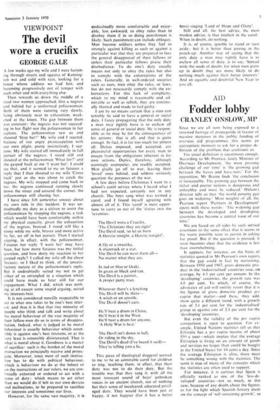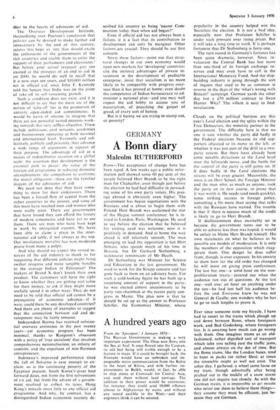AID
Fodder lobby
CRANLEY ONSLOW, MP
Since we are all now being exposed to a renewed barrage of propaganda in favour of massive increases in the public funding of overseas aid programmes, this seems an appropriate moment to ask for a proper de- finition of the problem that confronts us.
The usual definition is unanimous enough. According to Mr Prentice, lately Minister of Overseas Development, 'the most pressing challenge of our time' is 'the growing gap between the haves and have-nots.' For the opposition, Mr Braine finds 'the conclusion is inescapable. The growing gap between the richer and poorer nations is dangerous and unhealthy and must he reduced.' Oxfam's director tells us that 'the world poverty gap goes on widening.' Most weighty of all, the Pearson report 'Partners in Development' opens with these words: 'The widening gap between the developed and developing countries has become a central issue of our time.'
We are faced on all sides by such serried assertions to the same effect that it seems in the worst possible taste to persist in asking for proof. But if the question is pressed, it soon becomes clear that the evidence is less than overwhelming.
It appears, for instance, on the basis of statistics quoted in Mr Pearson's own report, that the gap could in fact be narrowing. Between 1950 and 1967, gross domestic pro. duct in the 'industrialised' countries rose, on average, by 4.3 per cent per annum. In the 'developing' countries, the growth rate was 4.8 per cent. To which, of course, the advocates of aid will swiftly retort that it is the figures of gross domestic product per capita that matter—and these, they add, show quite a different trend, with a growth rate of 3.1 per cent for the 'industrialised' group as against one of 2.4 per cent for the 'developing' countries.
But even the validity of the per capita comparison is open to question. For ex- ample, United Nations statistics tell us that Ethiopia has a per capita income of about $50 a year—which implies that the average Ethiopian is living on an amount of goods and services no larger than could be bought in the United States for 14 cents a day. Since the average Ethiopian is alive, there must be something wrong with the statistics. The same is true of many of the concepts which the statistics are often used to support.
For instance, it is curious that Spain is officially ranked as one of the 'less-de- veloped' countries—not so much, in this case, because of any doubt about the figures, as for the light which Spanish history sheds on the concept of 'self-sustaining growth', so
dear to the hearts of advocates of aid.
The Overseas Development Institute, rhapsodising over Pearson's conclusion that policies can he devised to make further aid unnecessary by the end of this century, salutes this hope as 'one that should excite the enthusiasm of the governments of the rich countries and enable them to enlist the support of their parliaments and electorates.' But before your actual taxpayer gets too excited at the prospect of an end to aid in AD 2000, he would do well to recall that it is now over ten years, and $10,000 million net in official aid, since John F. Kennedy told the Senate that India was on the point of take-off to self-sustaining growth.
Such a condition does not exist, and it is not difficult to see that the main use of the notion of 'take-off' lies in the promotion of entirely open-ended aid commitments. It would be naive of anyone to imagine that there are not powerful vested interests work- ing towards this very selfless objective. These include politicians, civil servants, academics and businessmen operating at both national and international level. Variously and col- lectively, publicly and privately, they advance a wide range of arguments in support of their purpose. The advantage of aid as a means of redistributive taxation on a global scale: the assertion that development is the essential path to peace: the value of the foreign aid programme in reducing domestic unemployment: the compulsion to conform; the moral obligation—these are the familiar slogans of the advocates of aid.
We need not deny that they have some- thing to show for their endeavours. There has been a forced flow of capital from the richer countries to the poorer, and some of this must have reached men and women who were really poor. There are governments that have found they can afford the luxury of modern armaments and have yet to use them. There are men who have been kept in work by unrequited exports. We have been able to claim a place in the inter- national aid table, if not always at the top. Our involuntary morality has won moderate praise from many a pulpit.
And why should we expect the vested in- terests of the aid industry to thank us for suggesting that different policies might bring swifter progress and more tangible benefits to the average Indian or Ethiopian? The makers of Brand X don't knock their own product. The customers still have the right to know whether they are getting real value for their money, to ask if they might more usefully spend it in other ways. They do not need to be told that official aid cannot be a prerequisite of economic advance—if it were, could there be any developed countries? And there are plenty of examples to suggest that the connection between aid and de- velopment may be fairly tenuous.
Independent Burma has received substan- tial overseas assistance in the past twenty years—yet economic progress has been minimal, thanks to Rangoon's obsession with a policy of 'true socialism' that involves comprehensive nationalisation. an infinity of controls, and the expulsion of non-Burmese entrepreneurs.
Indonesia's improved performance since the fall of Sukarno is easy enough to ex- plain: so is the continuing poverty of the Egyptian peasant. South Korea'sfrigreat leap forward dates, not from the first subventions of us aid, but from the advent of a govern- ment resolved to collect its taxes. Hong Kong's miracle owes little to any official aid programme. And why, by contrast, has a distinguished Indian economist recently de-
scribed his country as being 'nearer Com- munism today than when aid began?'
Even if official aid has not always been a failure, it is a fact that its contribution to development can only be marginal. Other factors are crucial. They should be our first concern.
Stress these factors—point out that struc- tural changes in our own economy would open new markets for 'developing' countries; cite the intrinsic advantages of private in- vestment in the development of profitable enterprise; insist that socialism is no more likely to be compatible with progress over- seas than it has proved at home; even doubt the competence of Indian bureaucracy to ad- minister a national plan—and you may well expect the aid lobby to accuse you of materialism, of preaching the gospel of greed, of every sort of heresy.
But is it heresy we are trying to stamp out, or poverty?















































 Previous page
Previous page